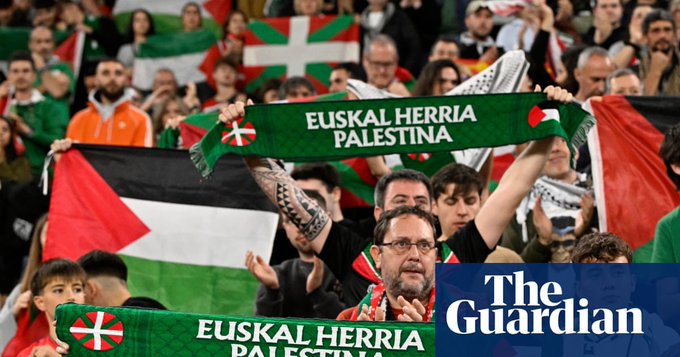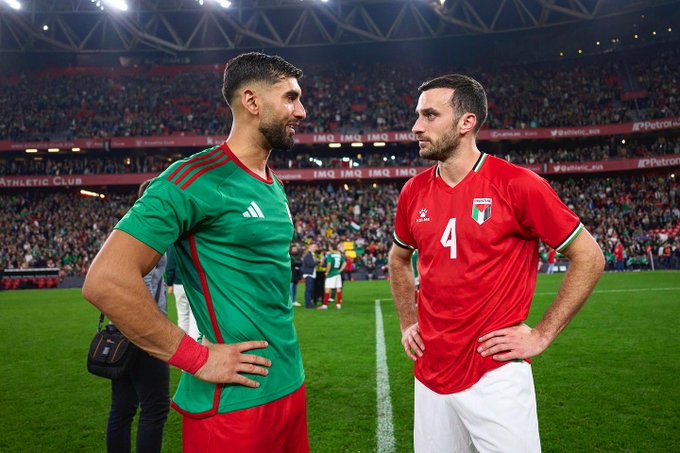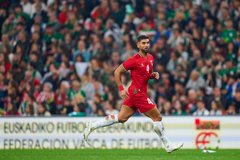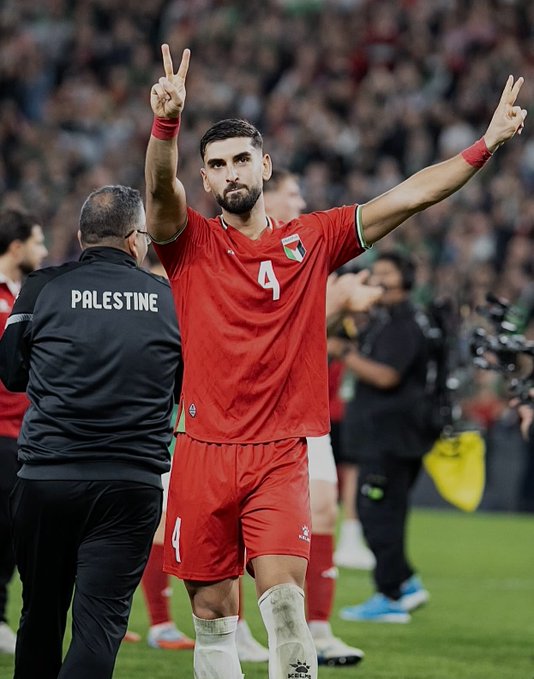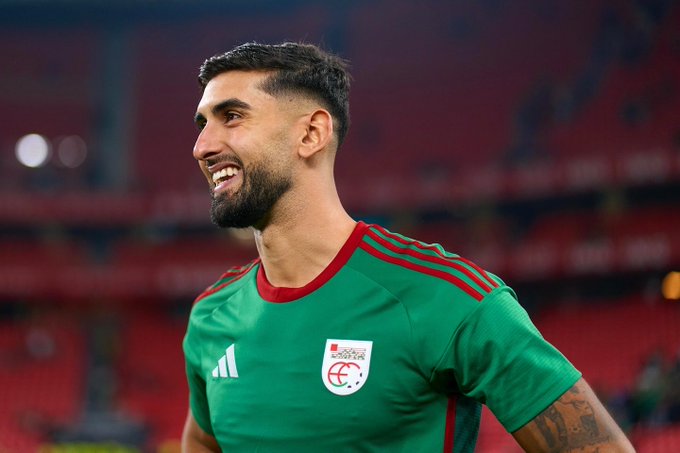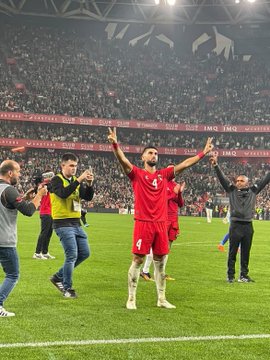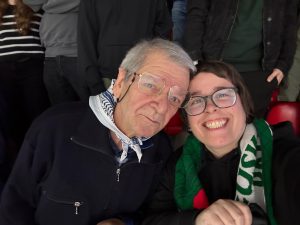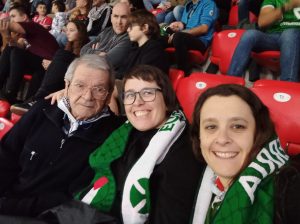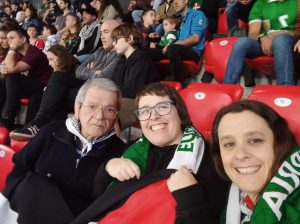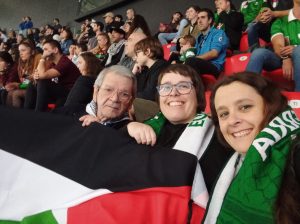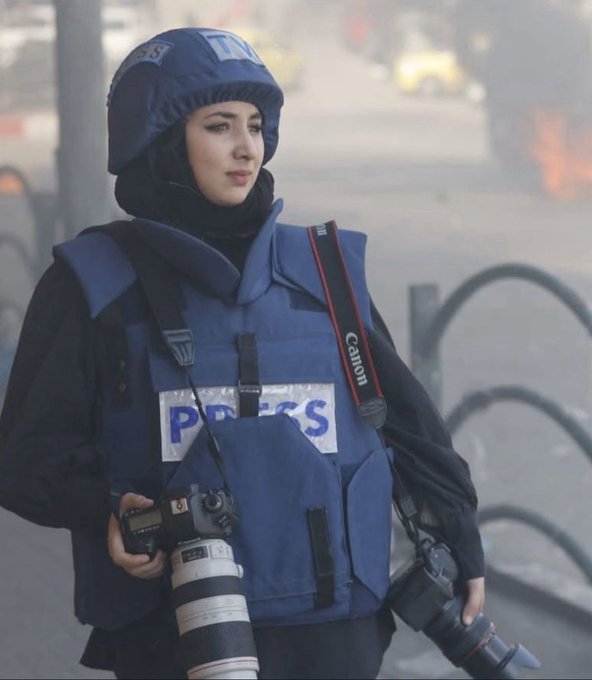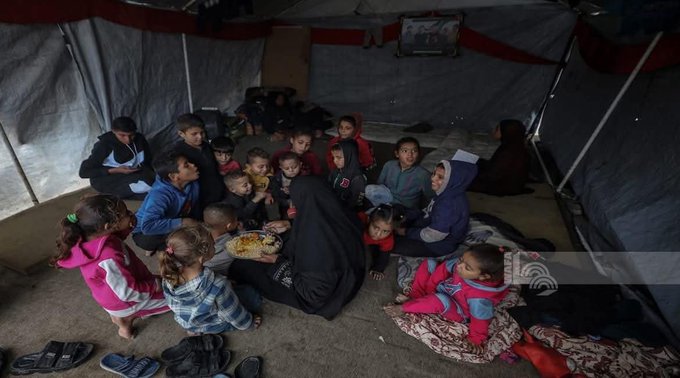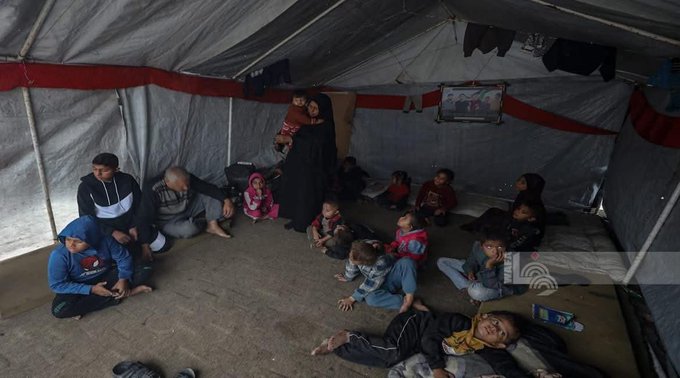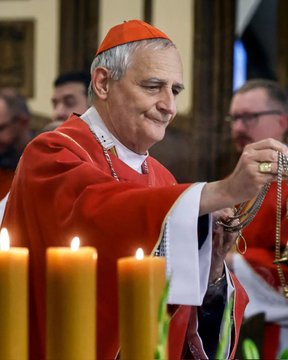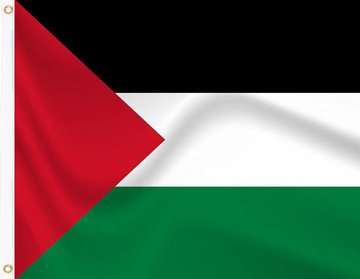Ibaitik Itsasora
******
In 1948 Albert Einstein foresaw the Israeli terrorism in Palestine that would eventually bring a catastrophe on the Jewish colonists.
******
Russia is not Enemy@RussiaIsntEnemy
“Einstein said, “I do not know with what weapons World War III will be fought, but World War IV will be fought with sticks and stones.” This statement reflects the understanding that a third world war could mean the end of civilization. Today, this realization should restrain us from taking extremely dangerous actions in the international arena that threaten our modern civilization.” – President Putin
******
In 1983, Paul Newman stated that the American state disregards the truth, always creating exaggerated enemies to justify wars and massacres for profit, while ignoring crimes committed by other nations like Israel
Bideoa: https://x.com/i/status/1990281960099651624
oooooo
ooo
‘It touched us from the start’: Palestine savour historic night in Bilbao
More than 50,000 fans cheered on Ihab Abu Jazar’s team with the coach and players ‘shocked’ by the outpouring of support during their visit
By Sid Lowe at San Mamés
Mon 17 Nov 2025
“We are more than a national team, we represent a story of pain but also hope,” Ihab Abu Jazar said, “and we are not alone.” At 8.26pm on Saturday the Palestine coach, whose father was killed in the Israel-Gaza war and whose siblings now live in tents in Khan Younis, emerged from the tunnel and took his place by the bench at San Mamés, Bilbao. Dressed in black, a keffiyeh over his shoulders, he watched 11 men in red, “a team of refugees playing for Palestinians all over the world”, and listened to 51,396 people applaud them, chanting for their freedom.
“We don’t play just to win; we play to exist,” he had said in the days before Palestine played their first game in Europe, an occasion that turned out to be bigger than even he had imagined: “The most important day in my life”, a “historic” night that “all the words in the world can’t explain”. They didn’t win – they were a goal down within four minutes and lost 3-0 against the Basque national team – but they competed, and it wasn’t about that. In fact, when Zaid Qunbar looked like he might equalise after 12 minutes the whole of this vast stadium cheered him on, roaring the opposition striker running towards their goal.
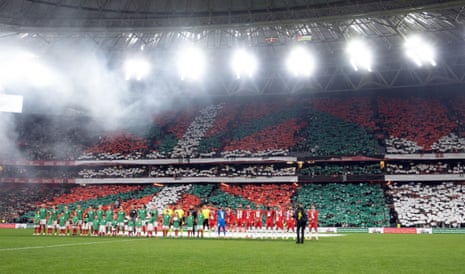
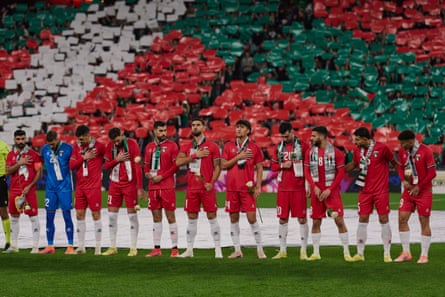
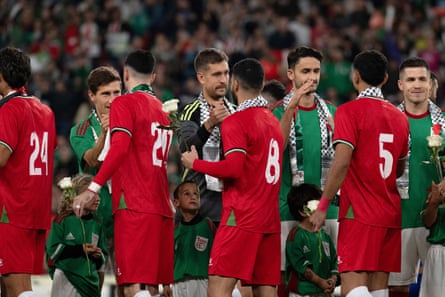
They had cheered all of them, all night. “We have felt like we were at home; not a second home, our home: it touched us from the start,” Abu Jazar said. At the end they stood before the north stand at San Mamés, where flares burnt and Ikurriñas and Palestinian flags flew in green and red, many from the same masts: 50 footballers, arms around each other’s shoulders, and 50,000 fans singing together at the place so revered they call it the Cathedral. Euskal Selekzioa, the Basque team unrecognised by Fifa and playing just their fifth game in a decade; and a Palestine side that was not recognised by Fifa until 1998 and hasn’t played at home since 2019.
Of the Palestinian players standing there only one had been here before, and this match started with him. Yaser Hamed was born in Cruces hospital in Barakaldo, 4km away, and raised in Leioa just the other side of the Nervión river. His father, Ahmad, from the north of the Gaza Strip, came at 17 and studied medicine at Euskal Herriko Unibertsitatea (EHU), the university of the Basque Country. There, he met Hamed’s mother, who is from Miranda de Ebro. Ahmad could play a bit, once going on trial at Rayo Vallecano; Yaser could play a bit better, joining the Athletic Club Bilbao academy at 10, where he trained for six years.
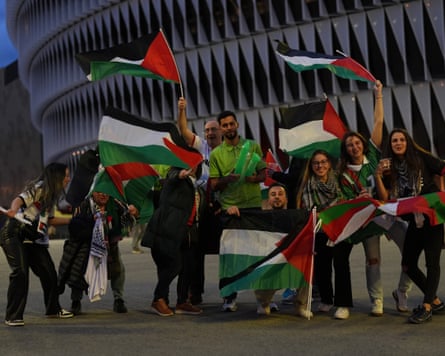
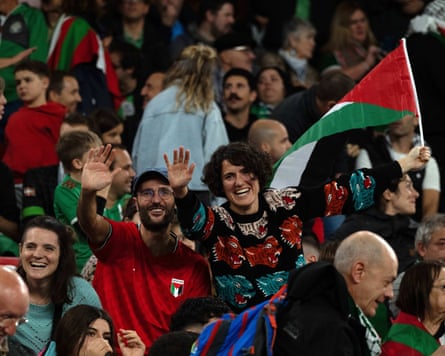
- Palestine fans mingle in and around the stadium ahead of kick-off.
By the time Hamed got a Facebook message from the Palestinian Football Association in 2019, he was 22 and playing for nearby Portugalete in Spain’s fourth tier. The day they contacted him, he had just missed out in the promotion playoff to Segunda B and was unaware they knew of his existence, but on his debut he scored the only goal in a 1-0 win against Yemen. Like all bar one of Palestine’s 26-man squad, he plays his football outside Palestine, moving from Portugalete to Bahrain, Egypt, Kuwait, India and Qatar. Now he was home, playing a part in bringing Palestine here and himself back to Bilbao on Saturday night.
“It is not just a game. Let’s hope it gives us a voice so the world can see what is happening,” Hamed had said. This time, they were determined, the world would. When Athletic had paid homage to victims of the war before their game against Mallorca in October, 11 Palestinian refugees living in the Basque Country accompanying them on to the pitch and Iñaki Williams going along the line shaking each of them by the hand, La Liga refused to show the footage, directors pulling back to show an out-of-stadium shot instead.

- Zeid Qunbar has an early effort on goal for Palestine.
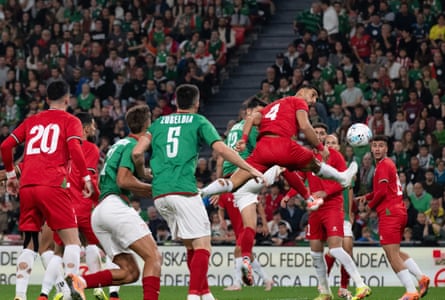
- Yaser Hamed (No 4) heads towards goal in the first half.
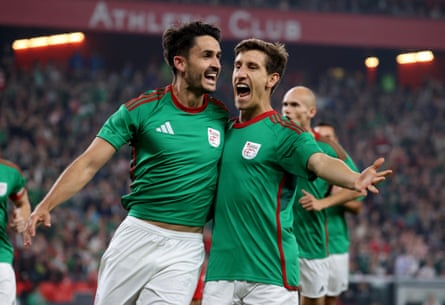
- Unai Elgezabal celebrates scoring the opening goal for Basque Country.

- The Athletic Bilbao forward Gorka Guruzeta celebrates scoring the second goal.
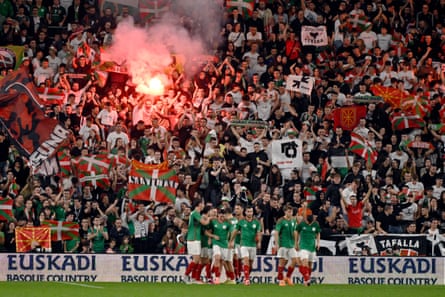
- The Basque fans celebrate as Urko Izeta scores the third and final goal for the home side.
The game had been announced at the peace museum in Gernika, destroyed by the Luftwaffe in April 1937 and depicted in Pablo Picasso’s painting. Iker Goñi, president of the Basque Football Federation, described it as a way to demonstrate solidarity with Palestine, call for peace in Gaza and state their desire for official recognition: if Scotland, Wales, Northern Ireland and Gibraltar could have national teams, why not the Basque Country? He also said it was an opportunity to give something back: during the civil war, in 1936 and 1937, a Basque team had escaped to tour France, the USSR, Norway, Denmark, Mexico, Chile, Argentina, and Cuba. “Other countries showed solidarity with the Basque people then; this is the return game.”
More than 30,000 tickets priced between €20 and €30 were sold the first day, the proceeds going to Palestinian aid run by Médecins sans Frontières, it became a sell out, and the game was broadcast on Basque TV. Palestine were accommodated at the halls of residence at the EHU university. They prepared at Lezama, Athletic’s training ground. In the hours leading up to the match, two marches of solidarity set off through the streets of Bilbao, with more than 20,000 attending according to local police. They were joined by supporters groups from Athletic, Real Sociedad, Alavés and Osasuna.
They set off from the Arriaga theatre, where there was poetry and flowers in homage to the Palestinian athletes killed. They arrived at Plaza Sagrados Corazones just as the rain started, the Palestinian FA president, Jibril Rajoub, at the head of the march. There they were greeted by an aurresku, a traditional Basque dance. The streets were packed, everything green, red and black, the shared colours of the two teams, keffiyehs everywhere. Turning left up towards San Mamés, a human passageway was prepared, Palestine’s team bus guided through towards the ground. And there it starts.
Inside, the centre circle is covered by a fragment from Gernika, a figure looking to the sky, crying as the bombs fall. An air raid siren goes off and on come Sol Band, alongside Basque artists Izaro and Eñaut Elorrieta, Rahaf Shamaly’s haunting voice carrying round the stadium. When the teams come out of the tunnel, they are accompanied by children. The Basque players are anyway – and that, the Euskadi coach Jagoba Arrasate admitted later, carries with it a power that hits him hard. Palestine’s players instead carry white roses, symbols of the children they have lost.
As they go along the line, Palestine’s players remove the scarves they are wearing and drape them over their opponents’ shoulders. A mosaic is raised around the stadium, Basque and Palestinian flags, colours becoming one, like the teams. Palestine pose for a photo with a banner that reads: “Stop genocide”, Euskadi with another one calling for official recognition of their national team, and then the two come together before a sign that says peace in English, Euskera and Arabic. The place is thick with smoke, a huge arena full. “Gora Palestina Erresistentzia”, the banner across the stand reads. “In that moment when I came on to the pitch, I can’t explain it in words,” Abu Jazar says.
This is the first time, he thinks, he has ever cried at the national anthem. With the footballers gathered around the centre circle, silence falls: “We remembered all the Palestinians killed in the genocide, the suffering of the Palestinian people,” the coach says. A minute passes without a sound. It is the only one all night: the atmosphere is extraordinary, the noise intense and unrelenting. “Almost 52,000 people supporting Palestine, shouting for Palestine,” Abu Jazar says. Unai Elgezabal scores the first, the Levante defender getting to the first corner before anyone else to make it 1-0, and there is a roar but far louder still are those that greet Palestine, the Basque fans willing them to score.
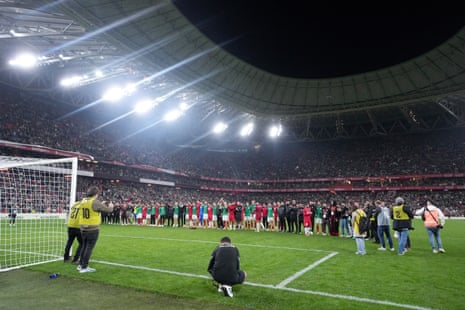


“Palestina askatu!”, Free Palestine, goes round and round, again and again. Girona’s Hugo Rincón is taken down by Wadji Mohammed and Gorka Guruzeta converts the penalty to make it 2-0 just before half-time. When the teams return the second half the Jai alai pelota Basque national team – whose recently granted official status has been challenged by the Spanish federation, another message – hands them a guard of honour, xistera wicker basket gloves raised to form a tunnel. A chant goes round of Gora Palestina! they bounce and sing and raise their torches. A Mexican wave runs round. At exactly 10 o’clock, the scoreboard confirms the attendance: 51,396, a huge figure.
Urko Izeta soon scores the third. Euskal Selekzioa are too fast, another level, Abu Jazar admits, but says he is pleased with his players. When Hamed is taken off with two minutes to go, embracing his coach as he crosses the line, there is a standing ovation. And when the final whistle goes, not a second added, there is another: louder and longer this time, more chants of “Palestina askatu!” Abu Jazar heads on to the pitch, urgently waving at his players to join him. He leads them gratefully on a lap of honour, unfolding a banner to take with them. “Thank you Basque Country,” it says in English.
The Euskal Selekzioa players follow them, slowly at first then jogging to catch up, to share this. No one is leaving. When they reach the north stand, they embrace, and stand before supporters. Staff, players, everyone. In a long line, arms around each other, they sing Mikel Laboa’s Txoria txori, a song of freedom about a bird who could be yours if you clipped its wings but then it would not be a bird. Players don’t want to leave, gathering in groups, holding on to this moment. Hamed has swapped shirts with Iñigo Lekue and seems to be trying to say hello to every last one of them. “Incredible,” he says.
When at last they withdraw, in a quiet corner under the stand, one of the Euskal Selekzioa contingent says to a friend: “You, who have seen it all … have you ever seen anything like this?” “No,” comes the reply, “never.”
“Unforgettable,” Arrasate calls it. “The players have experienced something unique,” the Basque coach says. “I’m proud of the heart Euskadi has shown, the solidarity towards a people who are suffering. I will carry this with me, all of it: the mosaic, the silence, the lap of honour, the stands: all powerful images. They came here for the first time and will remember it for ever and that is our great victory. This is a demonstration of where football can take you. I’m not talking results, or play, or anything. This fulfils us. Football’s not the most important thing in life but it can take you places you could never imagine.”
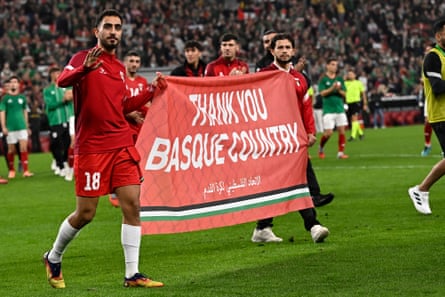
In the press room, Abu Jazar is looking at him through the glass. “I knew I would find solidarity and support but nothing like this: I am in shock, I don’t have the words,” the Palestine manager says. “Not just in the stadium but from the moment we arrived at the airport, in the street, everywhere. Every step you take here, you feel it. The Basque people are the greatest support we have ever had. It’s the most important day in my life; my mother prayed for me to have this career. It has been a weight on me, a responsibility to represent Palestine, but it’s in our genes to overcome. I will never forget the Basque and Palestinian teams because they’ve made history. I will tell this story for the rest of my life.”
oooooo
Bara’a Al-Jarjawi excelled in her high school with a 97.9% GPA Despite her father’s inability to afford school stationary.
She turned aid carton boxes into notebooks for her lessons, took care of her family, and had her exams in her flimsy tent.
Norena:
Bideoa: https://x.com/i/status/1989999460114379154
oooooo
Sol Band, a music group from Gaza who survived the genocide being committed by Israel, kicks off the sold out Palestinian vs Basque Country match for charity.
Bideoa: https://x.com/i/status/1990127337032077535
oooooo
Still trying to process what we lived
Bizitakoa oraindik prozesatzen saiatzen naiz
Todavía intentando asimilar lo que vivimos
ما زلت أحاول استيعاب ما عشنا
erabiltzaileari erantzuten
المباراة التي حلمت بها دائمًا أصبحت حقيقة. سان ماميس، ملعب تاريخي توحّد برسالة سلام. شكرًا لكونكم جزءًا من ليلة لا تُنسى!
erabiltzaileari erantzuten
Beti amestu dudan partida egia bihurtu zen.
San Mamés, estadio historikoa, bakearen mezuak batu zuena.
Eskerrik asko gau ahaztezinean gurekin egoteagatik!
Bilbao Basque Country , Charity Match full house.
Basque Country vs Palestine at San Mames stadium Bilbao on 53,000 sold out on Saturday
All proceeds from the match will go to fund humanitarian aid, the reconstruction of Gaza and the urgent needs of the Palestinian people.
Bideoa: https://x.com/i/status/1990406316146209251
oooooo
Garazi, Irati eta Joseba San Mames-en. Euskal Herria vs Palestina ikusten:
oooooo
@tobararbulu # mmt@tobararbulu
ELA y LAB apoyan la propuesta de EH Bildu para blindar el euskara y rechazan la del PNV | Euskal Herria | Naiz
oooooo
A list of Palestinian children murdered by Israel
Bideoa: https://x.com/i/status/1990480055516962889
oooooo
A harrowing account from imprisoned Palestianin journalist Farah Abu Ayyash has emerged:
Her lawyer, Hassan Abadi, who recently visited her in Damon Prison, said that what she shared was not just a legal testimony, but a direct, personal description of the severe abuse she has suffered since her arrest. In the letter conveyed through her lawyer, Farah recounts:
“I experienced so many horrific things.
They arrested me in the middle of the night with dozens of soldiers, two female recruits, and numerous jeeps and police vehicles. I never imagined I would be targeted. They took me to Karmeh Tzur, tied me to a chair outside, next to a pipe dripping filthy water onto me.”
She continues describing the torture: “The female soldiers tightened the white plastic restraints on my wrist so hard that my artery swelled. An officer eventually cut them off with pliers. Dogs tore at my pants. Then they put me in solitary—just a room filled with electrical boxes. They pretended not to know I was a journalist. They forced me to unlock my phone… I work with complete transparency.”
Farah describes her transfer to the Russian Compound: “It was like a horror film. They shoved me inside with handcuffs, leg shackles, and a heavy chain on my shoulders. Nahshon officers beat me. A female soldier grabbed my hair, slammed my head into the wall, and ordered me to kiss the Israeli flag. I refused. She kicked me. I was sick.”
Her voice, she says, was shaking as she added: “In Ramla, they put me in an abandoned room and turned off the light. I screamed. Then they placed me in an underground cell infested with cockroaches, insects, and bedbugs. I cried all night. Cockroaches covered my face and body. The marks are still there.”
She explains that she was later taken back to the Russian Compound, fainted multiple times from the cold, and that the transport conditions were “extremely harsh and terrifying.” After 55 days, she was moved to Damon Prison.
Expressing her disappointment in her peers, she says: “I’m hurt by my fellow journalists. They didn’t create pressure or raise their voices for my release. I was arrested because of my work. I hope every free journalist hears me.”
Farah also sends words to her family, especially her mother: “I miss you so much… I tell the girls about the ma’amoul you make. My most cherished memories are the poems you wrote for me and how I used to recite them on the radio.”
HEARTBREAKING: An elderly grandmother in Gaza is raising an entire generation alone. Umm Muhammad Al-Ayoubi from Al-Shujaiya, Gaza City, is caring for 36 grandchildren after Israel killed all five of her sons during the genocide on Gaza.
oooooo
Cardinal Zuppi read the names of every chiId who was kiIIed by Israel in Gaza
It took him 7 hours
oooooo
Geure herriari, Euskal Herriari dagokionez, hona hemen gure apustu bakarra:
We Basques do need a real Basque independent State in the Western Pyrenees, just a democratic lay or secular state, with all the formal characteristics of any independent State: Central Bank, Treasury, proper currency1, out of the European Distopia and faraway from NATO, being a BRICS partner…
Euskal Herriaren independentzia eta Mikel Torka
eta
Esadazu arren, zer da gu euskaldunok egiten ari garena eta zer egingo dugun
gehi
MTM: Zipriztinak (2), 2025: Warren Mosler
(Pinturak: Mikel Torka)
Gehigarriak:
MTM klase borrokarik gabe, kontabilitate hutsa da
1 This way, our new Basque government will have infinite money to deal with. (Gogoratzekoa: Moneta jaulkitzaileko kasu guztietan, Gobernuak infinitu diru dauka.)

